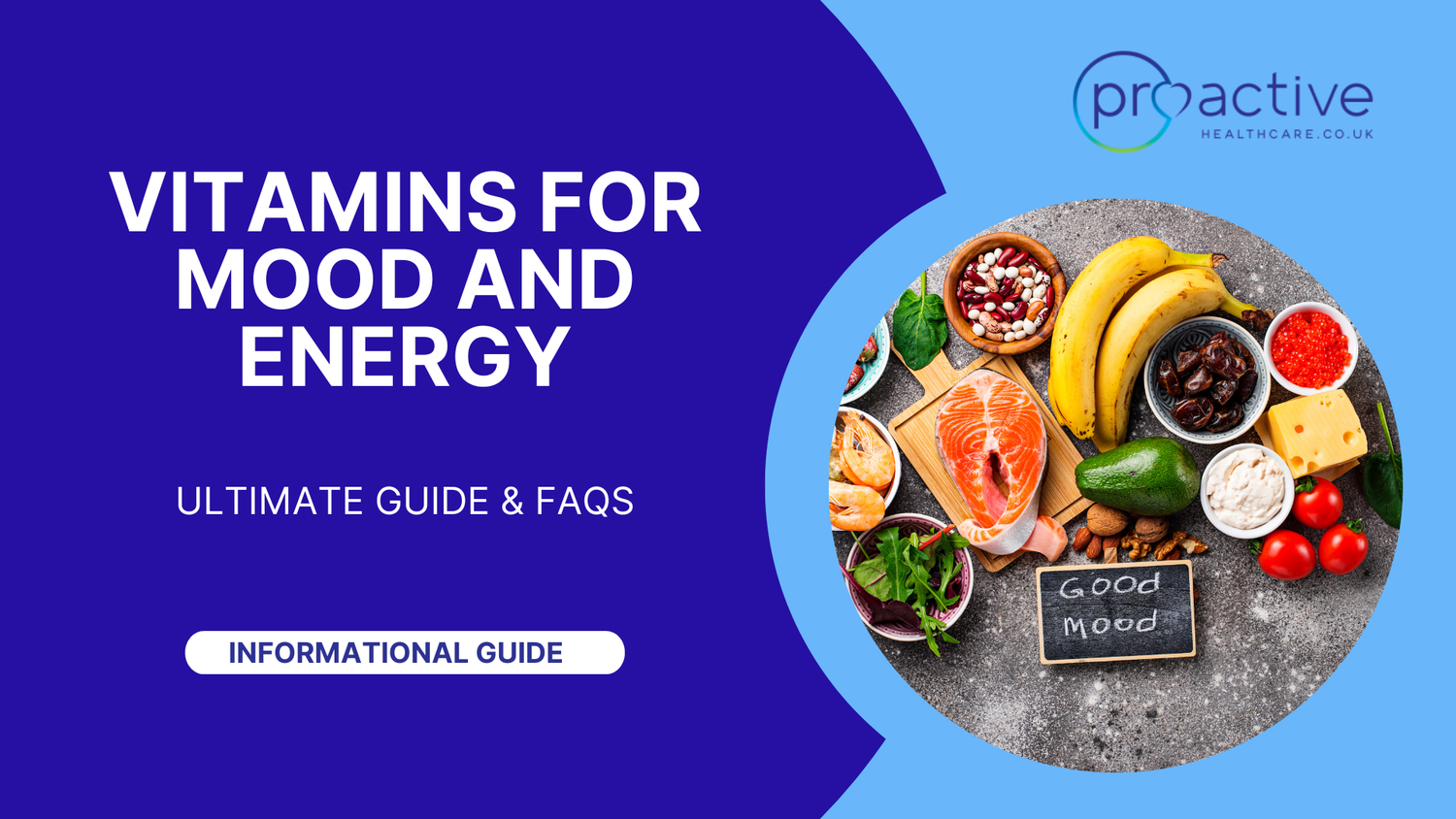Vitamins for Mood and Energy: Essential Nutrients for Well-being

Struggling with low energy and mood swings? You're not alone.
In a world where mental well-being is paramount, discovering the right balance of nutrients is key. This insightful guide delves into the vital role of vitamins and minerals in enhancing mood and energy. From the significance of B vitamins in mood regulation to the energy-boosting power of iron, we uncover the essential nutrients that are often missing in our diets. Whether you're considering supplementation or seeking to improve your dietary choices, this article offers practical, scientifically-backed advice to elevate your mental and physical health.
Let's jump straight in with the fundamentals.
Fundamentals of Vitamins for Mood and Energy

A balanced diet rich in essential nutrients plays a crucial role in mental health, mood regulation, and energy levels. Among these nutrients, vitamins and minerals function as critical co-factors for metabolic pathways that influence both mental health and energy production.
-
B Vitamins: A group of water-soluble vitamins that are integral to energy production and neuronal function. Deficiencies in certain B vitamins can lead to fatigue and mood disturbances.
- Vitamin B12: Necessary for nerve tissue health, brain function, and the production of red blood cells.
- Folic Acid (Vitamin B9): Engages in the formation of DNA and is vital for the maintenance of new cells, including red blood cells.
- Vitamin B6: Involved in cognitive development and immune function by aiding in neurotransmitter synthesis and regulation.
-
Vitamin D: Synthesised in the skin in response to sunlight; supports mood regulation and may have a protective effect against mood disorders.
-
Vitamin C: An antioxidant that aids in the synthesis of neurotransmitters like norepinephrine, affecting mood and energy levels.
Italics indicate vitamin importance:
- Vitamin B6: Essential for neurotransmitter synthesis.
- Folic Acid: Important for preventing neural tube defects in early pregnancy.
Minerals such as iron are pivotal for transporting oxygen throughout the body, deficiencies of which can result in anaemia and consequent fatigue and mood changes.
Nutrition is a foundational aspect of maintaining optimal energy and mood. Ensuring that one's diet includes a variety of nutrients may help support both cognitive functions and general well-being. For those struggling to meet their nutritional needs through diet alone, supplementation may be helpful, but should be undertaken with professional guidance.
In summary, an adequate intake of specific vitamins and minerals is imperative for optimal mental health and energy levels.
Role of Specific Vitamins and Minerals

Vitamins and minerals significantly influence energy levels and mood. Their roles are specific and critical to various bodily functions, from neurotransmitter synthesis to energy production.
B Vitamins and Mood Enhancement
B Vitamins, such as B12 (cobalamin), niacin, and folate, are pivotal for mood regulation through their role in neurotransmitter synthesis. Adequate levels of these vitamins may help ameliorate symptoms of depression and anxiety. For instance, Vitamin B12 is notably linked with the reduction of stress and improvement in emotional wellbeing.
Iron and Energy Levels
Iron is essential for combating fatigue and promoting vigour. It facilitates oxygen transport within the body, which is crucial for energy production and aerobic exercise performance. Low iron levels can lead to anemia, associated with fatigue and cognitive decline. Ensuring sufficient iron intake can help maintain adequate energy levels.
Vitamin D and Psychological Health
Linked with reducing the risk of depression, Vitamin D plays a role in maintaining mental health and wellbeing. It is also associated with regulating mood and improving cognitive function, and adequate levels may help alleviate stress and anxiety symptoms.
Antioxidant Vitamins and Mental Clarity
Vitamin A, Vitamin C, and Vitamin E are potent antioxidants that protect brain tissue from oxidative stress which can lead to cognitive decline. These antioxidant vitamins could support neurodevelopment and maintain mental clarity, reducing the burden of mental health challenges.
Minerals Impact on Mood and Energy
Minerals such as calcium, magnesium, zinc, copper, and potassium are key regulators of mood and energy. For instance, magnesium is involved in over 300 biochemical reactions in the body, including those that contribute to neurotransmitter function and energy metabolism. Sufficient levels promote better sleep quality, which is vital for mental health and daily energy.
Practical Guidelines for Supplementation

When considering vitamin supplements for energy and mood, it’s vital to approach supplementation with informed care and an understanding of individual needs.
Safe Dosages and Recommended Intakes
The body requires vitamins and minerals in specific quantities for optimal function. For instance, Vitamin B complex, which plays a significant role in energy management and mental wellbeing, has recommended daily allowances that vary by specific B vitamin type. Vitamin D, essential for mood regulation, should be consumed at around 10 micrograms per day according to NHS guidelines. Safe dosages are expressed in milligrams (mg) or international units (IU) and should be adhered to, as excessive intakes can lead to side effects or toxicity.
Interactions with Medications and Conditions
Taking supplements can have potential interactions with prescribed medications or existing health conditions. For example, certain medications can deplete nutrients, while some supplements can exacerbate psychiatric symptoms or influence the efficacy of drugs. Individuals should discuss with a pharmacist or healthcare professional about any possible interactions, especially during pregnancy, when certain supplements such as high doses of vitamin A can be harmful.
Lifestyle Considerations and Dietary Habits
Incorporating regular exercise and stress reduction techniques can enhance the effectiveness of nutrients from both diet and supplements. Nutritional choices should be adjusted to support a balanced diet rich in fruits and vegetables, which can improve energy levels and mental health. A healthy diet that includes a variety of nutrients often reduces the need for additional supplements.
Natural Dietary Sources versus Supplements
While vitamins such as B and D are crucial for alleviating feelings of fatigue and maintaining mental equilibrium, one can often receive adequate amounts through a nutritionally rich diet. Vegan and vegetarian diets may require supplements, notably of vitamin B12, which is primarily found in animal products. The potential benefits of supplements like Bio.Me Mind + Mood, which contain probiotics and biotin, may complement nutritional intake, especially for individuals facing stress-related digestive issues.
Consulting Healthcare Professionals
Before starting any new supplement regimen, consulting healthcare professionals is imperative. They can provide detailed analysis of dietary needs, recommend specific supplements, and ensure the safety and suitability of these products for individual health requirements and lifestyle factors. Pregnant individuals or those with underlying health conditions should always seek medical advice before supplementing due to the potential for nutrient-drug interactions and side effects.
Scientific Insights and Ongoing Research

This section explores the significant strides made in understanding how vitamins affect mental health, energy levels, and cognition, alongside the emerging directions in nutritional science.
Impact of Vitamins on Neurotransmitter Synthesis
Vitamins such as B6 and folic acid are crucial for the synthesis of neurotransmitters, which are chemical messengers in the brain influencing mood and energy. Research shows that these vitamins can aid in creating neurotransmitters like serotonin and dopamine, thus potentially improving mental well-being and cognitive functions.
Vitamins Influence on Socioeconomic Health Factors
Socioeconomic status (SES) has been linked to nutritional deficiencies, including vitamin insufficiency. Studies suggest that those with lower SES may have reduced access to nutrient-rich foods, impacting mental health and cognitive abilities due to a lack of essential vitamins in their diet.
Exploring the Link Between Diet and Cognitive Disorders
The relationship between nutrition and cognitive health, particularly in the context of ageing and cognitive decline, has become a focal area of research. Diets rich in specific vitamins are being studied for their potential to delay or prevent the onset of cognitive disorders such as dementia.
Recent Findings in Nutritional Psychiatry
Nutritional psychiatry is a growing field examining the role of various vitamins in mental health and mood disorders. Emerging evidence suggests that vitamins, alongside a balanced diet, may play a role in managing conditions such as depression and anxiety.
Future Directions in Vitamin Research
The landscape of vitamin research continually evolves with new studies focusing on the impact of NAD+ on energy and cellular health. Future research aims to further determine the implications of vitamin supplementation on both physical health and psychological well-being.
Frequently Asked Questions

In this section, we'll address common queries on how certain vitamins and supplements can influence mood and energy levels.
What supplements are known to improve symptoms of depression?
Certain supplements such as omega-3 fatty acids, St. John's Wort, and SAM-e have been associated with improved symptoms of depression. It's critical to consult a healthcare provider before starting any supplement regimen for mental health.
Which nutrients are associated with enhanced mood and energy levels?
B vitamins, specifically B12 and B6, play an important role in brain health and are known to boost energy and mood. Vitamin D is also pivotal for mental well-being and maintaining positive energy levels.
Can taking multivitamins lead to increased feelings of happiness and vitality?
While multivitamin supplements can fill nutritional gaps in one's diet, they are not a direct route to happiness. However, maintaining a balanced intake of essential vitamins and minerals can support overall health, which may contribute to improved mood and vitality.
What natural options exist for stabilising mood swings and irritability?
Herbs like chamomile and valerian root, as well as magnesium, have calming effects that might help stabilise mood swings. Adequate hydration and regular exercise are also beneficial in managing irritability.
Are there specific vitamins recommended for women to boost mood and reduce anxiety?
For women, vitamins like B9 (folate) and B6 are crucial in managing hormonal fluctuations that can impact mood. Additionally, mood calming strategies, including the use of therapeutic supplements, may be beneficial.
What are effective natural enhancers for managing symptoms of depression?
Physical activity, sunlight exposure, and nutrients like omega-3s are natural mood enhancers. They boost endorphin levels and may positively affect neurotransmitter function, helping to alleviate symptoms of depression.









